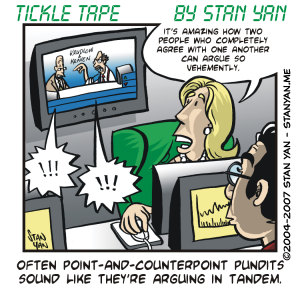Successful traders are disciplined. They are calm and rational. They don’t let emotions like fear or greed unduly bias their decisions. They formulate well-defined trading plans and are able to follow them. They avoid the urge to act on impulse. Trading in a systematic, disciplined fashion is preferred, but as we all know, traders aren’t always disciplined. A psychological study by researchers at SUNY, Albany (Muraven, Slessareva, & Shmueli, 2003) on the dynamics of self-control may provide insights into what it takes to maintain discipline and self-control.
It takes physical and psychological energy to maintain self-control. For example, research studies have shown that for many people, there are limits to how much self-control one can exert. When people are asked in the laboratory to complete a series of tasks in which self-control must be maintained, they eventually become fatigued and have difficulty maintaining self-control on subsequent tasks. This phenomenon is commonly observed in scalpers who go in and out of the market repeatedly.
They report that making trade after trade produces fatigue to the point that it is difficult to continue trading. Self-control takes energy, and the more self-control you must exert, the more energy it takes to keep going. As with any strenuous activity, you eventually run out of energy, and it’s hard to go on. Thus, the most obvious way to maintain self-control over the long run is to build up psychological energy.
How can you save or build up psychological energy? Specifically, you can limit the number of trades you make per day or per week, and thus, limit the amount of energy you expend. You can also make sure you sleep soundly, exercise regularly, and eat nutritious meals. This will also ensure that your physical and psychological energy is at peak levels.
A psychological study by Muraven and colleagues offers an interesting twist to the dynamics of self-control that is especially pertinent to trading. Motivational incentives, such as the profits traders receive from winning trades, can exert a powerful influence on the ability to maintain self-control. When incentives are low, people are less likely to maintain self-control. For example, in laboratory studies, if participants are given a little incentive, and feel tired and worn-out after completing various tasks that require self-control, they eventually get so fatigued that they become undisciplined on subsequent tasks. Participants who perceive a greater reward for sustaining discipline, in contrast, can more easily maintain self-control.
It’s as if they are thinking, “I’m tired; I want to just take it easy and cut loose, but the incentives are high enough that I’m going to hold out a little longer.” You might see how this finding has implications for trading. If a trader makes trade after trade, scrupulously following a detailed trading plan, but has not seen much profit, he or she will have trouble maintaining discipline on subsequent trades. The trader may think, “What’s the point. I’ve been following my plan to no avail, and I might as well just trade more freely.” When one is fatigued, trading plans are likely to be abandoned.
A second interesting finding concerns how fatigue influences the perception of rewards. When participants were fatigued as a result of completing a series of tasks requiring self-control, they had difficulty perceiving incentives accurately. They under-valued the rewards, and therefore, the incentives were less motivating.
These studies show how fatigue and motivational factors influence one’s ability to maintain self-control. When traders are tired and worn out from making a series of trades, they will have difficulty maintaining self-control. In addition, the potential rewards that may be achieved by maintaining self-control will be minimized when one is fatigued. Thus, it’s to your advantage to build up as much psychological energy as possible. If you have a great deal of energy, you will be able to be more in tune with the potential rewards you’ll receive by maintaining discipline.
And if the potential rewards are at the forefront, they can act as powerful motivators. You’ll continue to maintain discipline even if you start to become a little fatigued. Don’t underestimate the impact of the psychological processes that can help you maintain discipline. Make sure that you are rested, relaxed, and full of energy before you start the trading day. The more energy you have available, the more easily you can maintain the self-control you need to stick with your trading plan and to achieve consistent profitability.


